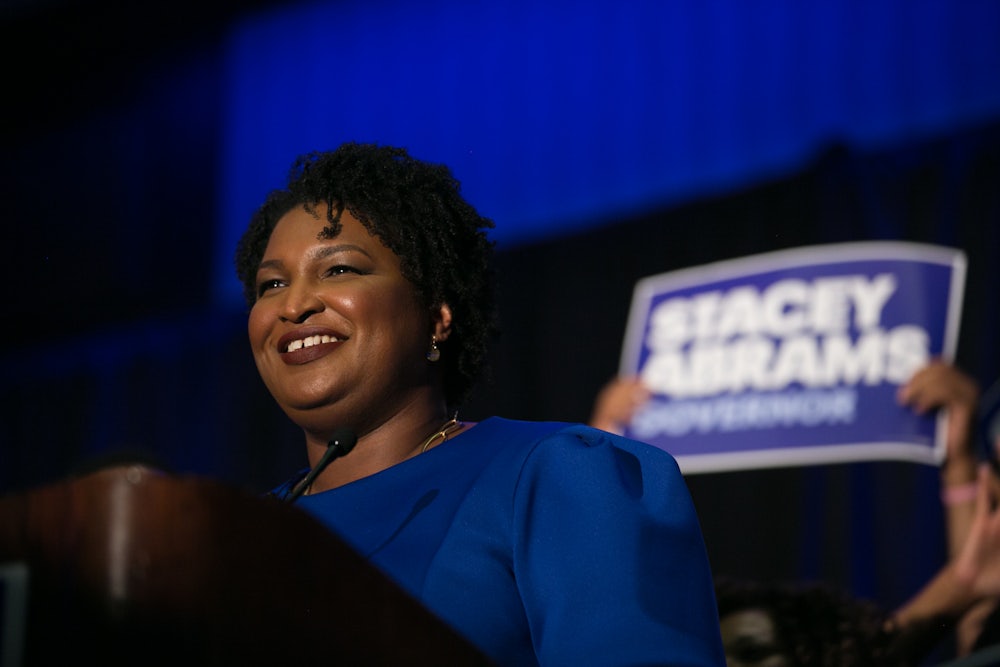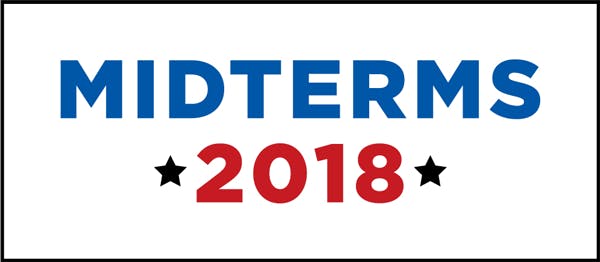There’s a cynical old saying—often falsely attributed to Mark Twain—that if voting changed anything, it would be illegal. Over the past decade, Republicans across the country have tried to prove this aphorism right by passing a wave of restrictive voting measures at the state and local level. Those laws, combined with hardball tactics like partisan gerrymandering and certain structural advantages, helped entrench conservative rule over large swaths of an increasingly liberal America.
In November, Americans will have a chance to reverse that tide. The midterm elections are widely seen as a referendum on the Trump administration, and for good reason. But voters will also be weighing in on something even bigger than the president: the future of American democracy.
Trump looms large over this subject. His tone, temperament, and actions are more authoritarian than any of his predecessors. He’s sought to purge and take command of the Justice Department and federal law-enforcement agencies, claiming that they should be investigating his opponents instead of him or his allies. He openly sympathizes with foreign dictators while alienating longtime U.S. allies. And he’s contemptuous of the fabric of civil society, dismissing mainstream news outlets as “fake news” and claiming that protesters are paid agents of a Jewish billionaire.
Trump’s confidence in American elections hinges on a simple metric: the extent to which they personally validate him. When his poll numbers plummeted after the Access Hollywood tape surfaced in mid-October 2016, he repeatedly issued false and incendiary warnings to his supporters that the election would be rigged against him. Trump’s attacks quieted the moment he was elected president, only to start again when it became clear that almost three million more voters chose Hillary Clinton instead. “In addition to winning the Electoral College in a landslide, I won the popular vote if you deduct the millions of people who voted illegally,” he wrote on Twitter.
The Constitution’s framers anticipated that men like Trump might one day capture the presidency, and took steps to prepare for it. Their system of checks and balances, however, is effectively moribund under House Speaker Paul Ryan and Senate Majority Leader Mitch McConnell. Congressional Republicans have largely used their oversight powers to shield the Trump administration from scrutiny, whether by not investigating obvious scandals or by using their powers to undermine investigations in other parts of the government. The House Intelligence Committee’s GOP majority spends most of its time these days trying to discredit the Russia investigation so that Trump can shut it down before it inflicts any more political damage.
Democrats could theoretically restore those checks by retaking the House and Senate next month. Most polls give them a good shot at capturing the former and an outside chance at taking the latter. While those races are capturing the bulk of the nation’s attention, there are other major contests at the state and local level where voters will consider candidates and measures that could bolster the nation’s democratic processes, or at least not actively weaken them.
Foremost among these efforts is Florida’s Amendment 4, which is aimed at the state’s felon-disenfranchisement rules. Under the state’s constitution, Florida is one of four states where people with felony convictions permanently lose their right to vote, except for the lucky few who successfully persuade a state board to restore it. As a result, more than 1.5 million Floridians—amounting to roughly 10 percent of the state’s otherwise eligible electorate—can’t cast a ballot. The effect is disproportionately felt in communities of color: Almost 21 percent of black adults are disenfranchised by the provision, for example.
Florida’s constitution requires that amendments get 60 percent of the vote for enactment. Amendment 4 enjoys the support of Andrew Gillum, the state’s Democratic gubernatorial candidate, and the ambivalence of his Republican opponent Ron DeSantis. The measure is currently polling well enough that it’s likely to pass in November. If it does, it would give hundreds of thousands of Floridians the ability to participate in the political process once again. It would also erase a structural advantage for Republican candidates in the state, one that may have tipped presidential elections in the past.
In other states, voters are mulling ballot initiatives and constitutional amendments that also strengthen access to the electoral process. Nevadans will have the chance to join more than a dozen states in enacting automatic voter registration. A constitutional amendment in Michigan would also enact AVR alongside a slate of other reforms, including Election Day registration and no-excuse absentee ballots. Michigan is one of a handful of states considering redistricting reforms as well, alongside Colorado, Missouri, and Utah.
In a sense, redistricting will be on the ballot in almost every state. More than 6,000 seats in state legislatures are at stake in this fall’s election. In multiple states, a Democratic wave could propel the party into full control of the legislative and executive branches. FiveThirtyEight’s Nathaniel Rakich found that Democrats could achieve a “trifecta”—single-party control of both houses of the state legislature as well as the governorship—in Colorado, Florida, Illinois, Maine, Michigan, New Mexico, New York, and Nevada. Voters could also break Republican trifectas in Arizona, Georgia, Iowa, Kansas, New Hampshire, Ohio, Oklahoma, and Wisconsin.
While these races are fought at the state level, they carry national importance in 2018 and in 2020. All of the governors and some of the state lawmakers elected this November will still be in power after the 2020 Census kicks off the next wave of redistricting. The last census coincided with a Republican wave in the 2010 midterms that handed them full control of more than two dozen state governments. Once in power, GOP officials in those states were able to gerrymander congressional districts to strengthen their electoral prospects for the rest of the decade. Voters’ choices in 29 gubernatorial races this year and hundreds of state legislative battles could make it harder for another ten years of Republican entrenchment this time.
Finally, there’s the perennially under-appreciated contests for state secretaries of state. In many states, the secretary of state is also the chief elections officer. That role gives them valuable influence over the integrity of the state’s electoral process. Look no further than Kris Kobach, the current Kansas secretary of state who is currently locked in a tight race for the governorship there. Kobach is best known for his campaigns against the perceived threat of voter fraud. Until this spring, he chaired Trump’s now-defunct national commission on the subject, which eventually found no widespread evidence to support its claims. A federal court blocked the state voter ID law that Kobach had enthusiastically championed and found him in contempt for not registering tens of thousands of voters who had been blocked by it.
Though voter fraud is virtually nonexistent, Republicans have used the specter of it to pass a wave of restrictive voting measures. Voter ID laws in particular often disenfranchise thousands of otherwise eligible voters because they can’t meet onerous or time-consuming criteria to exercise a basic right. North Dakota’s version of the law, for example, requires voters to use IDs with their current residential address instead of a mailing address. The restriction effectively disenfranchises thousands of Native Americans with IDs listing their P.O. boxes because the U.S. Postal Service doesn’t offer residential delivery to rural reservations. The Supreme Court refused earlier this week to block the law from taking effect for next month’s election, which may ultimately cost Democratic Senator Heidi Heitkamp her seat.
Perhaps the best example of why state secretaries of state matter is currently unfolding in Georgia. The Associated Press reported this week that Georgia Secretary of State Brian Kemp is blocking 53,000 voter registration applications under what his office calls an “exact match” policy. The policy allows Kemp to freeze applications for minor typographical errors like a misplaced hyphen in a last name. According to the AP, 70 percent of the frozen applications are for black voters, raising concerns that the policy is being used in a racially discriminatory manner.
Kemp’s office defended the policy as a means to ensure the integrity of Georgia’s voter rolls. While he’s added new barriers to being placed on those rolls, Kemp has also been aggressive in removing voters from them—more than 1.4 million voter registrations since 2012, the AP found. The exact-match policy could be a significant blow to Stacey Abrams, the Democratic candidate for governor. Abrams is in a tight race that could come down to a few thousand voters. Her Republican opponent happens to be Brian Kemp.

